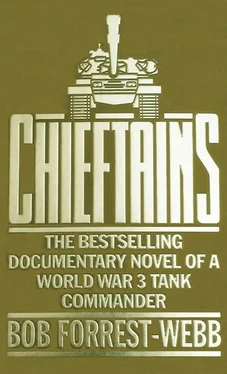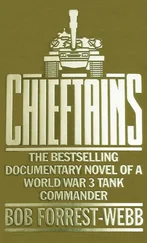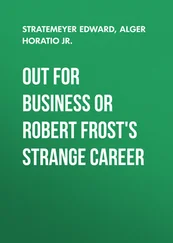Even as he examined the changed landscape there was a flurry of explosions around the village. It was like watching the silent movie of another war. The barrage intensified as though some artillery observer had called for an Uncle Target and all the guns of the division were joining in. Perhaps a Russian commander had been foolish enough to allow his armour to be drawn into the collection of buildings.
Much closer and, to his right where he traversed the periscope, he could distinguish the movement of enemy vehicles and he was attempting to identify them when the ground they were crossing disingegrate in one single eruption of fire and smoke. The giant explosion separated into individual shell-bursts. It seemed that nothing could survive in the holocaust that Fellows recognized as a defensive barrage from NATO aritllery positions to the west, but the dark armoured vehicles were pressing forward out of the smoke, joined by others on their left flank. Their charge was no longer ordered, the shelling had destroyed any semblance of formation. They were T-72s and T-64s, the latter easily distinguishable by the remote-controlled 12.7mm AAMG sited above the main gun. Close behind the battle tanks were a number of BMPs, tracked infantry carriers.
The artillery were now ranging on individual targets. He saw one tank swerve to avoid a deep crater, only to collide with another which had moved too close. He could almost feel the grinding of metal against metal, but the vehicles separated with a barely noticeable lowering of their speed.
They must have crossed the minefields south of Oebisfelde, and Fellows wondered about the casualties this must have cost them. The mines had been laid densely, and the invaders would have been under artillery attack as well. The tanks he was watching now, and the infantry combat vehicles, were the survivors.
‘You want a closer look, sir?’ It was Hinton, commander of the platoon of 22nd SAS. A lieutenant, there were no badges of rank on his smock. ‘Use the other ‘scope.’
Fellows walked with him in silence to the eastern end of the bunker, stepping through the groups of camouflage-streaked men who sat or lay on the concrete floor, many asleep. Hinton nodded towards the second periscope. Fellows put his eyes to the binocular lenses. He pulled his head back in surprise, then stared out again. Not fifteen meters away was the stationary hull of a 122mm self-propelled gun; on the slab side of its turret was a white circle, encompassing a red star.
He looked at Hinton and raised his eyebrows.
‘We counted eleven of them,’ said Hinton. ‘They’ve positioned themselves in a line running towards the south-east.’
There were normally only eighteen SPGs to a Soviet tank division, thought Fellows. As they would have had to cross the minefields while under artillery fire, the eleven Hinton had seen were probably the only ones to have made it. And they were on the left flank of what appeared to be a Soviet division’s main thrust. ‘Are they all the same type?’
‘I don’t think so. There were others, with a flatter profile and a grill on the hull just forward of the turret.’
‘M-1976s. Self-propelled howitzers. There’s a lot of West German armour facing Oebisfelde, so these SPGs must be part of an encircling movement. The Soviet recce units have probably passed us further to the south.’ It was tempting to use the VHF and get the information back to HQ; one quick air strike would remove the danger to the defending amour, who were probably already within the closing jaws of a pair of giant pincers. But they had been ordered to maintain complete radio silence; the men and vehicles encapsuled within the bunker already had their job to do. Regardless of anything which might happen out in the battlefields, they were to sit tight until contacted by HQ, on the evening of the first day of battle.
Hinton seemed to read his thoughts. ‘If they’re still here tonight, sir, we can do something about them. My lads will enjoy a bit of excitement close to home.’
Fellows raised his eyebrows, but remained silent. Hinton’s cockiness was what he expected from the SAS. He didn’t like them. They’d caught the press and public imagination, and came in for a lot of publicity which they claimed they didn’t want. In Fellows’ opinion, there were plenty of units in the army as capable, a fact which had been proved in Ireland.
Many times, Lt Colonel James Studley had been in his regiment’s mess, and heard descriptions of Second World War tank battles from officers who were retired or nearing the end of their service. He had listened, interested in the early part of his career when their memories had been fresher and their stories new to his ears, and then politely but with increasing boredom over the next few years. With time and alcohol he had heard the same stories repeated again and again until eventually he was able to switch off part of his mind yet still make the appropriate noises of amazement, horror or amusement, at the correct intervals. He had heard some of the troopers refer to old sweats as ‘when we’s’, from their habit of beginning a story with: ‘When we were at…’ or ‘when we were in…’ One day, somebody would probably give him the same label; now he hoped so, it would be proof he had survived.
He had never before seen a landscape such as he viewed from the command post. Primeval was the word he found to describe it best — if it could be described at all! A panorama incapable of sustaining human life, violent, ragged, volcanic, it contained no beauty, no peacefulness. Layered by heavy nauseous fumes, it erupted fire, spewed rock, earth and steel, convulsed and shuddered in a cacophony of deafening sound.
At first he had been able to distinguish the battle group’s own guns, the throaty roar of the Chieftain’s 120mms, the M109s. They had soon become lost amidst the howls and shrieks of the rockets, the clamorous thunder of artillery, the whines, moans and demonic screams of a hundred kinds of projectiles and their explosions.
The barn which concealed the command Sultans had been hit twice. First unintentionally, by a cannon shell fired by one of the many aircraft over the battlefront, and in the second instance by a heavy mortar bomb, which Studley believed might have been a Soviet M-160. The trajectory of the bomb, one of several to have landed in the area, had been checked-out on the three-dimensional surveillance radar and revealed the firing position to be located six kilometers to the east. The fire-point had been neutralized by artillery, but that was no comfort to the two infantrymen of the command platoon who had been killed.
Colonel Studley was feeling pleased with his command staff; everything seemed to be operating smoothly and efficiently. Young Douglas Whitley, the signals officer, had set a good example to the men when the mortar bomb had exploded, remaining cool and checking the equipment for possible damage even before the dust had settled. Philip Donelly, the adjutant, had almost ignored the incident, and continued his plotting of the group’s movements on the situation map with a Chinograph.
‘By the way, the French are in.’ One of the Divisional HQ staff had told Studley on the divisional network a few minutes previously. The radio communication had gone through the security scramblers.
‘Thank God! When?’
‘One minute after it all started. They mobilized reserves two days ago and are moving up their armour behind the Americans. It’ll ease things.’
‘One hell of a lot,’ agreed Studley.
‘What’s your situation?’
‘We’re holding at Mooonraker, but we’ll retire shortly. There’s a lot of Red armour in this sector.’
‘There are four Soviet divisions between Helmstedt and Wittingen. The Russian 16th Division’s main thrust appears to be towards Braunschweig. We believe this is their present Red. Helmstedt has been overrun by the Soviet 9th Division, and we think they will try to link-up with the 16th Division as they progress. We have reports of a Soviet recce battalion at Boitzenhagen, and a considerable drop of air assault troops at Wahrenholz. We also have a report of the use of chemical weapons on the front south of Lübeck… it’s confused and unconfirmed. Do as well for you to bear it in mind.’
Читать дальше












